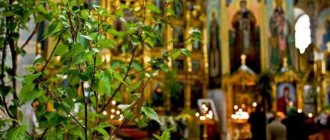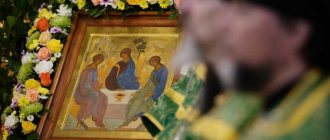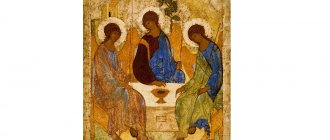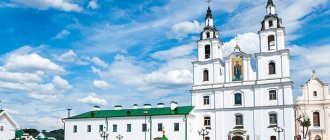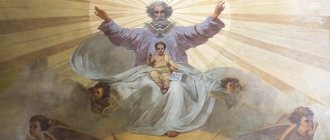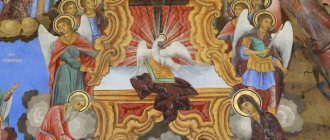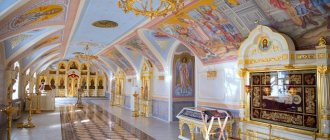What happened in the upper room of Zion with the apostles?
At the beginning of the Book of Acts, the evangelist Luke narrates:
When the day of Pentecost arrived they were all with one accord together. And suddenly there came a sound from heaven, as from a rushing strong wind, and it filled the whole house where they were sitting. And cloven tongues as of fire appeared to them, and one rested on each of them. And they were all filled with the Holy Spirit, and began to speak in other tongues, as the Spirit gave them utterance.
Pentecost the 50th day after Passover. On this day, the Israelis remembered how on Mount Sinai Moses received from the Lord the tablets with the 10 commandments.
That is why many Jews living in different parts of the empire gathered in Jerusalem. They heard the sound of a gusty wind and different voices. To figure out what was going on, they followed the noise to the Upper Room of Zion, where the apostles were staying. What they saw and heard especially surprised the Jews: the disciples of Christ, having received grace, spoke in different languages, so that everyone gathered in the house heard their own dialect.
But how could this phenomenon on the day of Pentecost be explained? Someone even put forward a version: they got drunk on wine. But in Jerusalem it was only the third hour - in our opinion, 9 am. And the appearance of the Savior’s disciples testified to the opposite.
Then the Apostle Peter addressed all those gathered with a sermon about Christ and an explanation of what was happening. Filled with the Holy Spirit, he spoke firmly, passionately, and confidently.
That Peter, who a few years ago was still a simple fisherman Simon. That Peter who walked on the water to meet Christ and, having doubts, began to drown. That apostle who denied Christ three times before the rooster crowed, and then repented of what he had done all his life.
June 7 - Pentecost. The Descent of the Holy Spirit on the Apostles
06 June 2020
The Day of the Holy Trinity (Pentecost, the Day of the Descent of the Holy Spirit on the Apostles) is one of the twelve holidays, commemorated prayerfully by the Orthodox Church on the fiftieth day after Easter.
Holy Trinity Day is one of the closest Orthodox holidays to Russian people. By this time, nature wakes up from its “winter sleep”; after a long winter, a new, full-blooded life begins. The floors of the temples are covered with freshly cut grass, the walls are decorated with birch branches, even the color of the priests’ clothes on this day is green. This is a symbol of renewal, a symbol of beginning. After all, on this day our Church was born.
With all the variety of names of this holiday, Trinity Day is dedicated to the descent of the Holy Spirit on the apostles on the fiftieth day after the Resurrection of Christ. By the descent of the Holy Spirit, the Christian faith is established in the world and the Church of Christ begins its existence. This holiday is considered the birthday of the Church! On this day, the Church brings her children to the threshold of her grace-filled life and calls on them to strengthen within themselves the gifts of the Holy Spirit that they received in the Sacrament of Baptism, since without the grace of God spiritual life is impossible. This mysterious power renews and transforms the entire inner world of a Christian. All the most sublime and valuable things that anyone can desire is given to him by God the Holy Spirit. This is why the Feast of the Holy Trinity is celebrated so solemnly and joyfully by Orthodox Christians. The name of the holiday, the Day of the Holy Trinity, is explained by the fact that the descent of the Holy Spirit on the apostles revealed the perfect activity of the third Person of the Most Holy Trinity, and the teaching of the Lord Jesus Christ about the Triune God and the participation of the Three Persons of the Divine in the Economy of the salvation of the human race reached complete clarity and completeness. God gradually revealed Himself to people: in Old Testament times people knew only about God the Father, from the time of the birth of the Savior people learned about His Only Begotten Son, on the day of the descent of the Holy Spirit people learned about the existence of the third Person of the Holy Trinity and thus learned to believe and glorify God, one in the essence of the Trinity in Persons - the Father, the Son, and the Holy Spirit - the Trinity Consubstantial and Indivisible. The descent of the Holy Spirit on the apostles on the day of Pentecost is described by the apostle and evangelist Luke in his book “The Acts of the Holy Apostles.” The Feast of the Holy Trinity, like other holidays of our Church, has its own history. In the Old Testament, this feast of Pentecost (Heb. “Shavuot”) - the fiftieth day after the Jewish Passover - was one of the three great Old Testament holidays. This holiday celebrated the adoption of the Sinai legislation under the prophet Moses, when 1500 years before the birth of Christ, at the foot of Mount Sinai, the Jewish people, liberated from Egypt, entered into an alliance with God. In the New Testament, this is the day of the descent of the Holy Spirit of God on the holy disciples and apostles in the form of tongues of fire, which took place in the Upper Room of Zion, where they gathered at the command of the Lord for the celebration of the Jewish Pentecost. Old Testament events have educational significance and become understandable in the light of New Testament events. The exodus of the Jews from Egyptian slavery prefigures the exodus of human nature from slavery to sin, which was realized in Christ Jesus our Lord, who is the New Passover. The giving of the Law to the Israelites through Moses on Mount Sinai prefigures the giving of the grace of the Holy Spirit to the apostles in tongues of fire. According to the time of year, the Jewish holiday of Pentecost coincided with the end of the harvest. Many Jews, scattered throughout different countries of the Roman Empire, tried to arrive in Jerusalem for this holiday. Having been born in other countries, many of them already had difficulty understanding the Hebrew language, but they tried to observe their religious customs and at least occasionally make pilgrimages to Jerusalem. The descent of the Holy Spirit was not an unexpected event for the apostles. Several centuries before the birth of the Savior, the Lord God began to prepare people for the day of their spiritual rebirth and predicted through the mouth of the prophets: “You will walk in My commandments and keep My statutes, and I will pour out My Spirit on all flesh... I will pour water on the thirsty and streams on dry... and you will joyfully draw water from the fountains of salvation... And I will give you a new heart and I will put a new spirit within you, and I will take away the heart of stone out of your flesh and give you a heart of flesh. I will put My Spirit within you and make you do it” (Joel 2:28; Isa. 12:3, 44:3). Preparing to return to His Heavenly Father, the Lord Jesus Christ, before the crucifixion, devotes His farewell conversation with the apostles to the upcoming descent of the Holy Spirit. The Lord explains to the disciples that the Comforter - the Holy Spirit - must soon come to them in order to complete the work of saving people. “I will ask the Father,” says the Lord to the apostles, “and He will give you another Comforter, may He abide with you forever, the Spirit of Truth... He will teach you everything and remind you of everything that I have told you... He is the Spirit of Truth... The Spirit of Truth He who proceeds from the Father will testify about Me” (John 14:16-17, 26; 15:26). Preparing to receive the Holy Spirit after the Lord's ascension into Heaven, the disciples of Christ, together with the Blessed Virgin Mary, some myrrh-bearing women and other believers (about 120 people) were in Jerusalem at Pentecost in the so-called “Zion Upper Room”. This was probably in that large room where, shortly before His suffering, the Lord celebrated the Last Supper. The apostles and all those gathered were waiting for the Savior to send them the “Promise of the Father” and they would be clothed with power from above, although they did not know what the coming of the Comforter Spirit would actually consist of (Luke 24:49). Since the Lord Jesus Christ died and rose again during the period of the Old Testament Easter, the feast of the Old Testament Pentecost fell that year on the 50th day after the Resurrection of Christ. By this time, the apostles were no longer confused and depressed, as after the crucifixion of Christ. The Savior's disciples already understood that He left behind not just a handful of followers, but the Church. Despite the fact that the apostles were not residents of Jerusalem (most of them were from Galilee), they had not gone home for fifty days, meeting daily in that same Zion upper room. After all, Christ Himself asked them not to leave the city and wait for the baptism of the Holy Spirit. And so, at the third hour (in our opinion - at the ninth hour of the morning) (Acts 1:13), a noise was heard above the Zion upper room, as if from the wind. At the same time, many fiery tongues appeared above the heads of the apostles, which began to descend on each of them. Everyone on whom this tongue fell began to feel like a completely different person: peaceful, joyful, full of life, spiritual strength and ardent love for God. The apostles began to express their feelings in loud praise of God. And then it turned out that they were not speaking in their native language, but in some other, unknown ones (Acts 2:2-4). Everyone who heard them heard their native speech. For the apostles, knowledge of foreign languages was a gift of the Holy Spirit, necessary for the spread of the Gospel Truth throughout the world. Thus, on this day in the Zion Upper Room the Triune God appeared in His third hypostasis (the hypostasis of God the Holy Spirit), hence the name - the Feast of the Holy Trinity. God the Father created the world and sent His Son, Jesus Christ, to earth to show people the way to salvation, and God the Holy Spirit descended on the apostles, and through them, on each of us, to be close to people. The community of people in which the Holy Spirit is present is called the Church. Every Orthodox Christian prays “In the name of the Father, and the Son, and the Holy Spirit...”. One morning, having heard a strange noise, the surprised residents of Jerusalem began to approach the house where the apostles had gathered, and were very surprised when they heard that the people inside the house were speaking different languages. And, varied as the crowd was in their origin and language, each, however, heard some one preacher who glorified God in the language of his country. The surprise of many turned into horror, but there were also wicked people who “mocked and said” that the apostles “had gotten drunk on sweet wine” (Acts 2:13). Then the Apostle Peter came out to the audience and delivered a sermon in which he spoke about the glorious event that took place on this day, the fulfillment of ancient prophecies and the completion of that great work of saving people, which was accomplished on earth by the crucified and risen Lord Jesus Christ. The Apostle Peter pointed out to those gathered that in the miraculous descent of the Holy Spirit, the ancient prediction of the prophet Joel, who spoke on behalf of God: “... men of Judah, and all those living in Jerusalem! Let this be known to you, and listen to my words: they are not drunk, as you think, for it is now the third hour of the day; but this is what was foretold by the prophet Joel: And it shall come to pass in the last days, says God, that I will pour out My Spirit on all flesh, and your sons and your daughters shall prophesy; and your young men will see visions, and your old men will dream dreams. And on My servants and on My handmaids in those days I will pour out My Spirit, and they will prophesy” (Acts 2:14-18). The Apostle explained that it was precisely in such a descent of the Holy Spirit that the work of saving people was to be accomplished. In order to honor people with the grace of the Holy Spirit, the coming Messiah, the Lord Jesus Christ, suffered death on the cross and rose from the dead. After listening to him, “...they were touched in their hearts and said to Peter and the other Apostles: What should we do, men and brethren?” “Repent and be baptized every one of you in the name of Jesus Christ for the forgiveness of sins; and you will receive the gift of the Holy Spirit,” Saint Peter answered them. After this, “those who gladly received the word” immediately repented, believed, were baptized, and “about three thousand souls were added to the Church of Christ that day” (Acts 2:37-41). Thus, this event ended with the complete triumph of the Holy Spirit over unbelievers. Three times Jesus Christ gave the disciples the Holy Spirit: before suffering - implicitly (Matthew 10:20), after the Resurrection through a breath - more clearly (John 20:22), and now He sent Him essentially. Having received from God Himself the gift of prophesying, healing, and most importantly, bringing the Truth to people, the apostles dispersed throughout the world and preached in its farthest corners. The apostles were executed (only one of the twelve apostles, John, died a natural death), but what could the enemies do against those with whom the Holy Spirit is always present, Christians? Generations of people, rulers, and even entire states disappear from the face of the earth, but the Church has existed for two thousand years. It began once with a small group of people in the Zion Upper Room in Jerusalem. Being incorporeal, the Holy Spirit chose a sensual sign in order to manifest His presence all the more perceptibly. “For,” argues St. Gregory the Theologian, “just as the Son of God appeared visibly on earth, the Holy Spirit also had to appear visibly.” But “...let no one think,” teaches St. Leo the Great, “that in what was visible with bodily eyes, the very Divine being of the Holy Spirit appeared... Just as the human gaze cannot see the Father and the Son, so it cannot see the Holy Spirit.” The descent of the Holy Spirit on the apostles, strictly speaking, is a manifestation of His power in them, the discovery of His special presence in them. The Holy Spirit acted before in the human race: He was in the patriarchs, the prophets, in every pure soul; Without Him, not a single truly good deed has ever been accomplished. But the manifestation of His power in the apostles was the most important for the entire human race. The Holy Spirit descended to complete what the Savior began: to make the apostles capable of preaching the Gospel to the whole world, to assimilate to the human race those Divine gifts that were acquired for it by the suffering of the Son of God. The Apostles of Christ formed the Christian Church - a body of which Christ was the head, and the people included in it were equal members. On this day the Christian Church was born. God the Father laid its foundation in the Old Testament, God the Son created the Church by incarnating on earth, God the Holy Spirit acts in it. The apostles were not immortal, and they passed on the Divine grace that descended on them on the day of Pentecost to their followers by ordaining the first bishops. This grace remains in the Church to this day, transmitted through the Sacrament of ordination to bishops, priests and deacons. Another Sacrament in which a person receives the grace of the Holy Spirit is Baptism. It turns out that the apostles were the first to be baptized in this way (John the Baptist baptized only with water). The question arises: why, after the Sacrament of Baptism, are gifts such as knowledge of languages and the gift of healing not given to every Christian? This is an important question for many, because health is a good thing, and knowledge of languages is always useful. St. John Chrysostom explains this by saying that in the first times of Christianity it was so difficult for people to believe in the Resurrection that they needed to see a miracle, for example, such as the gift of speaking foreign languages. Then, when people’s faith grew stronger, they no longer needed these testimonies. So you shouldn’t think that we are deprived of something compared to the first Christians. On the contrary, we have what they did not have. Only we don’t see it (or don’t want to see it) and don’t appreciate it, chasing the temporary rather than the eternal. A historical moment deserves attention and mention in which, presumably, it was no coincidence that two significant events coincided on that day - the descent of the Holy Spirit and the Jewish Pentecost. The Old Testament Pentecost celebrated the deliverance of the Jews from Egyptian slavery and the beginning of a free life in union with God. The descent of the Holy Spirit on believers in Jesus Christ liberated believers from the power of the devil and was the beginning of a new, grace-filled union of people with God in His spiritual Kingdom. So the feast of Pentecost became the day when the Old Testament theocracy, which began from Sinai and long ruled society through a harsh written law, was replaced by the New Testament, in which believers are led by God Himself, in the spirit of freedom and love (Rom. 8). Why did the descent of the Holy Spirit occur on the 50th day after the Resurrection? What connection is there between this event and the Jewish Pentecost? “Weeks of days produce Pentecost, a holy day for them (Lev. 23:21),” St. wrote about the Jews. Gregory the Theologian, - weeks of years - the so-called jubilee, in which there was the abandonment of the land and the liberation of slaves and the return of purchased possessions to the former owners. For this people consecrates to God the firstfruits not only of fruits and firstborns, but also of days and years. Thus the celebration of the number seven led to the celebration of Pentecost. For the number seven, multiplied by itself, gives fifty, and one day is missing, but it is occupied by us from the next century and is the eighth, and at the same time the first, or, better said, one and endless. For there the local sabbath of souls must end, so that a portion of the seven and eight may be given (Ecc. 11:2), as some before us understood this saying of Solomon.” "The eighth day" is a metaphor that signifies a new era. The Holy Fathers call the future Council of all the Heavenly Powers “the eighth day”: in this century the days go by weeks, and when the Son of Man comes, a new era will begin - the “eighth day.” So the 50th day symbolizes the beginning of a new period in the history of the human race. When the Holy Spirit inseparably dwells on Earth - in the Church. John Chrysostom in one of his sermons compares the apostles and the prophet Ezekiel. The last one was shown a book scroll. When Ezekiel ate it, he began to prophesy. It was as if tongues of flame rested on the apostles. Why such a difference? “He received a scroll to remember the coming disasters, and these received fire to burn and destroy all the sins of the universe. Just as fire, falling into thorns, easily destroys it completely, so the grace of the Spirit destroys the sins of people.” The Feast of the Holy Trinity was established by the apostles. After the day of the descent of the Holy Spirit, they began to annually celebrate the day of Pentecost and commanded all Christians to remember this event (1 Cor. 16:8; Acts 20:16). Since ancient times, the Day of Holy Pentecost has been considered the birthday of the Church of Christ the Savior. In conclusion, we cite the words of Archimandrite John (Krestyankin) about the descent of the Holy Spirit on the apostles: “From the day of the event in the Zion Upper Room, a new power entered the world, the Power by which the Kingdom of God is established in the hearts of men.” From that day on, the Church, created not by the zeal of human interpretations and speculations, but by the will of God, continuously grew and was established - first of all, by the grace of the Holy Spirit. The doctrine of Christ has acquired a very solid foundation that cannot be shaken by anything. The Holy Church exalts general praise to the Most Holy Trinity and inspires us, believers in Christ, to sing “the Father without beginning, and the Son without beginning, and the Co-essential and Most Holy Spirit, the Trinity Consubstantial, Equivalent and Without Beginning.”
Like
- < Back
- Forward >
How did the Holy Spirit change the apostles?
But after the events of Pentecost, Peter changed dramatically. His sermons were so powerful that after them, 3-5 thousand people came to be baptized in one day. And the apostle himself confessed Christ so openly that under the cruel ruler of Rome, Nero, he suffered a martyr’s death. According to legend, Saint Peter considered himself unworthy to die like Christ. Therefore, he asked to turn his cross upside down.
This is just one example of how the apostles changed after the descent of the Holy Spirit. Each of the twelve received special grace. It was not only about understanding different languages. The hearts of the apostles were filled with special spiritual joy and love for God. Their connection with God was so strong that they could not help but share this grace with others, not preach, not heal the sick, not repeat the feat of Christ.
Yesterday's fishermen and illiterate people suddenly became fiery preachers. In a short time they were able to do what wise military leaders and strong rulers could not. By preaching the word of God to different nations in different languages, they united people. But not around the ideas of prosperity on earth and world government, but around Christ. All this happened due to the work of the Holy Spirit.
This is how a special spiritual organism arose - the Church. Since it all began precisely with the descent of the Holy Spirit on the apostles and the new sermon of the transformed Apostle Peter, the holiday is also called the Birthday of the Church . Of course, the understanding of the Church of Christ is in no way limited to the walls and vault of the temple.
Church of Christ ≠ temple
Filaret Drozdov writes that the Church is an established society of people from God, united by the Orthodox faith, the law of God, the hierarchy and the sacraments.
Although this definition does not exhaust the meaning of the concept, it places emphasis:
- The Church was established by God.
- It represents an association of people, a kind of conciliarity, a separate organism. All members of the Church believe in God, live according to the Scriptures and commandments and, accordingly, participate in the Sacraments.
It is written in Acts that after the Descent of the Holy Spirit, when the disciples formed the Church, they preached, prayed and broke bread - celebrated the Eucharist.
Read also:
Is the Church of Christ just a religious building with domes?
To become a member of the Church today, you must be baptized. During the celebration of the Sacrament, the person being baptized prayerfully renounces Satan and “is joined to Christ.” After this, chrismation is performed on him. In this Sacrament, the grace of the Holy Spirit is sent down to an adult or child.
Like the apostles and the first Christians, it is impossible for modern believers to remain in the Church without receiving the Holy Gifts. Indeed, thanks to the Eucharist, the believer receives a special gift - union with Christ.
This is the Church—a divinely inspired organism headed by the Savior—that Christ created.
For this purpose, the Holy Spirit descended from heaven and enlightened the disciples of Christ. For this, the apostles went to preach. So that every person can accept the Divine Truth, be transformed - become a member of the Church and be saved. This is the global meaning of the holiday, which is not by chance called the Day of the Holy Trinity. The holiday received this name due to the fact that after what happened in the Zion Upper Room there was no longer any doubt that the Christian God is the Trinity. One being in three Persons.
History of establishment
Of all the Christian holidays, Pentecost is perhaps the oldest, because the Apostles always celebrated it as the day of their spiritual birth. Subsequently, the tradition was continued by their disciples, subsequent Christians. Initially, the Church did not have a separate Spiritual day. He appeared in the East, under special circumstances, after the Second Ecumenical Council ( May 381 ).
The celebration, separate from Pentecost, is due to the fact that the Council condemned the false teaching of Macedonius, who denied the Divinity of the Spirit. In order to confirm Christians in the truth, the Council established a day of special veneration of the Third Person of the Trinity.
But in the West, the problem of heresies has not been so acute for a very long time; Therefore, Christians from the first centuries called the 50th day after Easter the Day of the Descent of the Holy Spirit, which corresponds to a historical event. This ancient practice continues to this day.
So now:
- For Orthodox Christians, Trinity Day and Spiritual Day are different holidays; True, this does not mean at all that the Third Person is not venerated on Pentecost, it’s just that for this purpose, in addition to the Trinity, there is one more, additional day, which is caused by historical circumstances;
- Among Catholics, according to an ancient tradition dating back to the Apostolic Age, the Day of the Spirit is, in fact, one - Pentecost, so here we can really talk about two holidays within one.
Trinity Day and the Mystery of the Holy Spirit
The Old Testament primarily, but not exclusively, speaks of God the Father. In the Gospel, the main emphasis is on the incarnation of the Son of God.
This does not mean that Holy Scripture does not mention the Holy Spirit until the Book of Acts. Not at all. But the disciples of Christ and the future readers of the Holy Scriptures seem to be preparing to understand how the Holy Spirit acts on a person.
Even when John the Baptist baptized Christ, the secret of the Holy Trinity was revealed to him - he dipped Jesus into the Jordanian waters, heard the voice of the Father and saw the Spirit coming out in the form of a dove. But all these events were hidden from other people.
Further, during the Savior’s sermon and conversations with the disciples, He first speaks about the Father, and then about the Comforter Spirit, Whom the Heavenly Father will send to the apostles. Under the influence of the Third Person of the Trinity, a person will be transformed, the truth will be revealed to him.
But Christ says that this will happen only when He ascends to the Father. And so it came true - on the 40th day after the Resurrection, the Savior rose into the sky on a cloud, and on the 50th, on the day of the Holy Trinity, the Holy Spirit descended on the disciples and enlightened them.
What John the Baptist foretold came true - the baptism of the Holy Spirit and fire, which would become possible after the Savior came to earth. Invisibly the disciples received grace, and visibly tongues of fire rested on them.
How is Spiritual Day celebrated?
The spread of Christianity throughout pagan countries was very often accompanied by a sort of “overlay” of holidays associated with the new faith on previous customs, superstitions, and traditions associated with the veneration of nature, to which pagans are so inclined, especially farmers, who reverently feel the life of forests, fields, their awakening in spring and early summer. Namely, it is at this time that Pentecost and the celebration that follows it usually occur.
Traditions and superstitions
Their “collection” among modern ethnologists is very extensive.
Birthday girl earth
Many Slavs believed that the “birthday” of the earth falls on this day, and in the most direct, literal sense - this is the day God created the world. After all, it is said in the Book of Genesis by the Spirit “hovering over the waters.”
Icon of the creation of the world
That's why:
- The Third Person of the Trinity descends from heaven, spreading over the meadows and fields; therefore, it is strictly forbidden to work, or generally disturb the earth, “pregnant” with a harvest, awaiting heavenly blessing; the presence of a fussing person here is harmful: supposedly, seeing such a person, the Spirit will “turn away from the path” and will not bless the field - all this is about the One who is “everywhere and fulfills everything”!
Interesting fact
The remainder of this custom can be observed to this day in some Slavic countries: this is the day off after the Trinity Day - which, by the way, makes it possible to come to the liturgy, celebrating the holiday with dignity. There is no such practice in Russia.
- the Croats deliberately opened windows and doors so that the Spirit could visit the house; True, they did this directly on Pentecost, because they are a Catholic people, which means they do not have a separate Spiritual day;
- in addition, there was a custom of “feeding” the “birthday girl”, and according to ancient pagan tradition, older women did this; they took the meal out to the field and ate the food here; then the older one began to spread the food across the field, dropping pieces of food; At the same time, ritual words were pronounced: “Birthday Earth, give us a harvest.”
A religious procession around the fields with sprinkling them with holy water got along quite well with these pagan traditions.
Procession
Revealing secrets
It was believed that during the holiday the earth could reveal the hidden to a person. What exactly? Of course, where the treasures lie. Many also went to the field to “listen” to them. It is clear that there is nothing at all Christianity
Modern scientists consider it mathematically impossible for the accidental origin of life on Earth
Spirit and souls?
Peasants in many areas were quite seriously convinced that, together with the Spirit, people were visited by their deceased loved ones - their souls flew in and... sat on the branches of birch trees, which were used to decorate the house, window frames, and also the red corner.
Spirit and perfume?
Russian peasants quite seriously believed in the existence of various animated creatures like mermaids. It was believed that they came out to the ground. This is good: where the mermaids run, there will be more moisture in the earth. However, they were feared, so they always called the priest to bless the wells - where mermaids could also be hiding... And the shepherds most often followed the lead of the parishioners.
In Ukraine, for example, priests consecrated treasures, first public, village, then personal, in private houses. The hospitable hosts set out tables in the courtyard with bread and salt and treated the priest. And the shepherd sprinkled holy water on the house - “so that the mermaids would not disturb...”
Sometimes a kind of “cult” of mermaids was combined with the idea of the souls of ancestors visiting the earth. For example, peasants of the Kaluga province came to consecrated wells, where they ritually washed themselves. And when they left, they left food nearby, just as many superstitious people now leave cookies and candies “for the deceased” at the grave.
Best day for herbal medicine?
However, many believers (just what?) were also convinced that all kinds of evil spirits, such as mermaids and goblins, were “afraid to roam the earth” during the holiday. Therefore, this is the best day to prepare healing herbal infusions or other potions.
Signs and customs
Numerous signs were also associated with the holiday - not so much remnants of paganism, but simply manifestations of the observation skills of villagers who lived side by side with nature:
- it was believed that real warmth began from this day, which is why they said: “Don’t trust the warmth until the Spiritual Day”;
- in addition, Russian peasants believed that whatever the weather would be like that day, that would be the case for the next six weeks; Taking into account the fact that the holiday is most often in June, and also how long our summer generally lasts, we were talking about weather conditions almost until the beginning of autumn;
- but here is an unpleasant omen: the Croatian villagers, who noticed that with the advent of real spring insects were waking up, said very ungodly: “The Holy Spirit came, brought one bag of flies, another bag of fleas”; they tried to be sure to clean the house (the birthday girl only the soil, but not the home!), otherwise those same fleas would definitely appear.
Why decorate houses and churches with birch branches on Trinity Sunday?
Every person is called to such transformation under the influence of the Spirit of Truth. By the way, this is exactly what the decoration of temples and houses with greenery, birch branches and flowers for the holiday symbolizes. Just as we decorate our homes from the outside and renew them, so the Third Person of the Trinity makes the believer transfigured, a temple of the Spirit of God.
Therefore, on the day of the Holy Trinity, it is important not to forget about the main meaning of the holiday, the birth of the Church and the transfiguration of a true Christian. And an external addition to such internal joy will be the decoration of homes and temples.
Metropolitan Hilarion’s film is also dedicated to the holiday of Trinity:
Iconography of the Feast of Pentecost
From the very beginning, the iconography of the Trinity was associated with another holiday - the Ascension of the Lord. Both dates were celebrated simultaneously until the 5th century. But then the dates were shifted, because, according to the book of the Acts of the Apostles, 10 days passed between the Ascension and the Descent of the Spirit. This is how the week of the Holy Trinity appeared. This event was reflected by icon painters who created individual works based on the book about the apostles.
The first iconographic images that can be found are reminiscent of the Ascension of the Lord. Those icons depict the apostles together with the Virgin Mary.
Later, the Virgin Mary disappeared from the canvases dedicated to Pentecost. A dove appeared in the images, which began to symbolize the condescension of the Divine. One of the most striking examples was the mosaic that was laid out on the Cathedral of St. Mark. The throne was laid out in the center, and a dove hovered nearby, announcing the descent. Around the throne are the apostles with tongues of flame descending from them.
Later, another element is added to iconographic images in honor of Pentecost. The Holy Scriptures spoke of 16 nations awaiting the descent. Therefore, representatives of these peoples began to be depicted next to the apostles. By the 12th century, a canon had been formed, which they began to adhere to when depicting Trinity Day.

